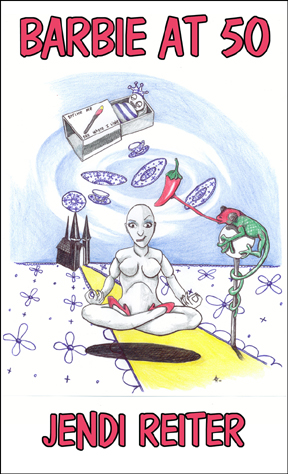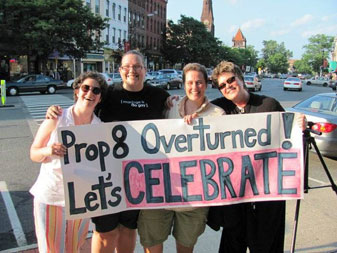These poems are reprinted by permission from Paula Brancato’s newest poetry chapbook, For My Father (Finishing Line Press, 2010). Reviewing this collection in the Denver Examiner, Zack Kopp writes, “Her collection For My Father takes the intimate despair of an extra/ordinary familycentric reality tunnel and using the alchemty of creativity, tranfoms it to something profound and remarkable.”
The Plastics Man
(for my father)
I.
She wanted to say she loved him, as the hospital
walls dissolved.
She wanted to tell him
about the boy she kissed once when he was
in Korea,
but in a morphine haze
she slipped into that night of mermaids
and moons.
Under the boardwalk, the sand cold, her
feet bare.
It was my father she missed
but the boy with the clean shaven face was
indisputably there,
the smell of citrus and his dark dank hair.
His hand brushed her cheek as their lips met.
The sea
roared on and in the pain of my father’s absence,
my mother sat with the boy.
I could still be a ballerina, she wanted to cry.
I could still
make babies. Most of all she wanted him,
my father, inside, inside.
To fill this hollowness.
II.
“Everything is fine,” my father crooned
to soothe himself. She was fast asleep already.
He looked down.
Something electric hit his heart and he dropped
her hand.
The wedding ring was gone. This is not my
beautiful house… this is not my beautiful wife.
Then he remembered.
It was home in the jewelry box he’d bought
her in Korea.
beside a small jar of cold cream, cover off,
capturing the last swish of her fingers.
“Everything is fine.”
He was holding her waist, so small, like the
tiny dancing
girl inside the jewelry box, a ballerina, who
twirled and twirled,
the tinny melody, the fullness of my mother’s
hips under his hands,
the timbre of her voice, not low, not high,
in his dreams she always laughed,
my cries and the babbling of my brother,
the tick-tock-tick
of the starburst clock in our hall, the dripping
sink, dishes piled high, wet
clothes that flapped into the laundry bag.
And footsteps.
The echoes of a family, no one there.
Every night, it was like that.
“Everything is fine.”
Every night she was here
in the sterile room.
III.
My father stood, dying for a cigarette.
He shifted his thoughts to his work,
because chemistry
was always easy, the titration he must make
next morning.
The solution. How life was like a saturate,
a sudden crystallization from the falling of a
final grain. Of the toughness,
the viability of petrochemical plastics. How capable
they were. My father was a “Plastics” man.
Using the handkerchief she ironed for him,
he blew his nose,
wiped his eyes. She only saw his shadow then,
heard the faint hum of the machines, morphine
dripping into her veins. Drifting, she smelled the
smell of him, her husband, traced his
lips in her dream. The salt of his skin, the starched
crispness of his collar, the heat of him
like an iron, the oily coils of his hair, faintly
mixed with the scent of tape and saline, the metallic
taste of the IV feed. The light was out: he’d
turned it down.
IV.
Somewhere in the dark, a baby cried. It was her.
She was the baby.
She was on someone’s knees, bouncing, an aunt’s,
an uncle’s,
she was passed from hand to hand. There was
a bright beach ball, red, yellow, green, and laughter.
The ball, thrown with speed, flew toward her.
Bigger and bigger.
She grew frightened, suddenly. It would fly
in her face,
no one to stop it. It would obliterate
everything. “No, no, please, don’t go. Please!”
she shouted.
Or thought she did. At the height of this eclipse,
she tried
to sit up but her box of a body fell back.
V.
My father, hand on the doorknob, heard her moans.
“I’m here,” he said, and turned back.
But he wasn’t. He too was lost.
Thinking of the national athlete he once was,
running the 440
around an asphalt track. The all-night lover
he could have been,
given half the chance. The IBM
VP climbing into his Olds in Poughkeepsie.
The Princeton scholar,
finishing his masters, my mother and brother
and I applauding, as photographers snapped
pictures and he alone explained how plastics
would save the world. The beautiful mistress Giselle
he might have had if he wasn’t a good Catholic
and didn’t turn her down.
They would be in Peru or Fiji, stripped down
in a bed, bathing
in the heat of one another. But at that moment,
there was only the honorable husband,
the benevolent father, the good son left to him,
the terror of raising me and my brother
very possibly alone,
a piquant scent of hospital,
and the remembered touch of my mother’s sex
the first time they’d made love,
her legs wrapped around him. He was gone,
though, of course, he turned
back and placed his arm under her shoulder.
****
Michael
They cannot go back. They can never go back. He is fifteen, fourteen, nine. She jumps him in checkers. He asks for her kiss. She gives him one black crown. He tosses his gum in, his baseball cards. For Mickey Mantle, Whitey Ford, she agrees. It is 1982. It is 1972. It is 1965. It is Coney Island. It is Rockaway Beach. It is Corona and the deli man. She tastes of coffee, cannoli, an octopus, sweet sausage and parmesan cheese. He tastes of ketchup, chocolate, salt and sand. Of boy, and not of man. It is Twiggy, the Pope, the Kennedy’s, lined up side-by-side. It is Elvis the Pelvis, Sid Ceaser, Cyd Charisse, Marilyn on Channel 5. The Last Supper hanging in the kitchen. A starburst clock in the hall. A Westinghouse refrigerator. Fathers spilling wine. It is prayer and haste and wait and waste. It is love and rosary beads. America kneels and beats the sheets. JFK has died. There are picnics and egg throws, barrel races, watermelon, pork chops, milk and Velveeta cheese. They compete as a three-legged team. He tucks his hand in her bathing suit bottom. When she punches his nose, it bleeds. There are mothers and fathers and brothers and sisters and nanas and uncles and aunts. A handkerchief appears. There are bottle caps in the asphalt. Malcolm X and Martin Luther. A black boy in Harlem with a two by four. A phone that coughs up dimes. Two years out, the Harvard Business School Class of 1959. They sit on the stoop. He shows her his knee. She greedily picks the scab. There are young men dying, air raids, jungles, grasses whipping wild. There are joy sticks, airlifts, agent orange bombings, napalm blasts and body bags. Under a desk, she swears she is not scared. While the air raid siren wails, he holds her hand. He is seven and a half. She is eight and a half. There is a quiet lake in Alley Pond. He claims ten pollywogs, possibly speared. There’s a crooked stick, some mud, a rock, one submerged branch, some lick-em-aid. She twists off her shoes to hasten the crossing. She grabs his wrists, he hugs her hips. They rock. They sway. They fall. She is a grade ahead of him. He is a head ahead of her. He is seven. There are railroad tracks. There are party shoes and school uniforms. He takes her on a dare. She is seven. He is six. She is five. He is four. He draws a big red house, a woman, a man. She sketches in trees and daffodils using her left hand. He gives her a crayon, muddy green. She paints in the leaves on his trees. She is three. He is two. She has him by the hand. He holds tight to her knees. There is a big white bunny. A soft blue blanket. A teddy bear. Yours. No, mine. They cannot go back. They can never go back. White, pure white. Oh mother. Oh father. It is September. It is November. It is the year that Michael died.

